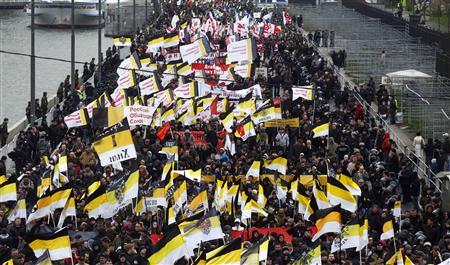
The ‘Russian March’ in 2013
The ‘Russian March’ in 2013
Tensions are high in Russia over the upcoming “Russian March,” which has taken place annually on November 4—“Unity Day”—since 2005, when it was first instigated by nationalists and neo-Nazis. The November 4 holiday was reinstituted by the government eight years ago to celebrate national unity. Speaking in 2009, then-president Dmitry Medvedev said that “This is an absolutely special date in the history of our country, today is a special holiday—the Day of National Unity, and also the feast day of the Kazan icon of the Mother of God, which is revered in our country and by our [Russian Orthodox] Church. I am convinced that events like that unite all of us even today [and] give us reason to believe that we are truly one people capable of overcoming great challenges that we have faced many times: a people that many times overpowered the enemy; a people that suffered, but remained strong and courageous” (https://www.kremlin.ru/news/5907). The “enemies” referred to by Medvedev were the Polish-Lithuanian forces who were evicted from Russia in 1612. But the day also has a religious significance due to it being the feast day of the icon of Our Lady of Kazan.
Nevertheless, the holiday itself lacks symbolic resonance among the population at large—few Russians are aware of it and just 1 percent of respondents listed it as a “very important” holiday according to surveys conducted by the Levada-Center in 2011 and 2012 (https://www.levada.ru/books/obshchestvennoe-mnenie-2012). Some argue that the timing of the holiday’s creation by the Kremlin was a preventative measure to ward off a repeat in Moscow of the “Orange Revolution,” which had occurred in Ukraine just a year earlier.
The lack of symbolic resonance of the holiday with the population allowed it to be hijacked by extremists. Originally, Alexander Dugin’s “Eurasian Youth Movement” forces marched alongside Russian nationalists and neo-Nazis. However, the organizers of the Russian March split in 2007 and the two different factions began organizing competing marches. Today, only the neo-Nazi and racist version of the march survives. It is organized by the members of the “Russkie” organization, which had participated in the post-2011 protests against Vladimir Putin. Infamous members of the “organizing committee” include skinhead Dmitry Demushkin and the extremist Movement Against Illegal Immigration (DPNI) leader Alexander Belov (https://www.dpni.org/articles/vazhnoe/37187/). Last year, the organizers of the Russian March ended the parade with a rock concert (https://www.interfax.ru/russia/news.asp?id=268504), presumably a move to popularize the nationalist cause through music (a tactic pioneered by British skinheads following racist rocker Ian Stuart Donaldson). Once again this year, the Russian March, which has been given prior consent by the Moscow city authorities, is going to end with a performance of the skinhead rock band Kolovrat (www.km.ru/v-rossii/2013/10/24/pravitelstvo-moskvy/723706-natsionalistam-zapretili-provodit-russkii-marsh-v-tse). The march is being organized through the Internet and particularly over the social networking site VK (formerly VKontakte.ru), a pattern which has become common among members of opposition movements in Russia (https://vk.com/rumarsh). The Internet offers a safe haven for such groups because the Kremlin’s repressive capabilities are significantly weakened there.
Notably, this year’s November 4 march is scheduled to take place in over 70 cities in Russia, and Odessa in Ukraine is also on the list of prospective marches (https://vk.com/topic-3966396_27141359). Nor will the “Russian March” be restricted solely to ethnic Russian regions—attempts have been made to organize marches in Kazan (Tatarstan) and Yakutsk (Sakha-Yakutia). The marches in Stavropol Krai—those taking place in Pyatigorsk and Stavropol city—are particularly likely to be contentious due to ethnically driven protests in nearby Nevinnomysk earlier this year (see EDM, September 9). A rally is also scheduled to take place in Krasnodar (https://vk.com/krasnodar_rus_marsh), although not in the Olympic city of Sochi.
This year’s march in Moscow promises to be especially controversial for a number of reasons. First, it comes less than a month after pogroms in the suburb of Biryulevo in southern Moscow, where, following the murder of an ethnic Russian, nationalists and neo-Nazis attacked a shopping center belonging to migrants (see EDM, October 21). The pogroms were attended by many visibly drunk young Russians as well as racist extremists, some of whom can be heard shouting “white power” in English on videos of the incident posted online (https://www.themoscowtimes.com/news/article/moscow-erupts-in-riots-over-killing-video/487790.html). A gathering of right-wing Russian nationalists is prone to spill over into violence given the polarized nature of ethnic identity in modern Russia.
Second, the march is liable to be lively due to a rival march being organized in response by immigrants in Russia. According to reports, the head of the Russian Migrants’ Federation, Muhammed Amin, has applied for official permission from the police to hold a counter-demonstration against the “Russian March,” which his group believes encourages violence against minorities (https://lenta.ru/news/2013/10/22/migrants/). This comes about a month and a half after neo-Nazis organized a protest against Putin’s plan to distribute Russian citizenship to citizens of former Soviet countries in Central Asia (see EDM, September 20). If the two marches happen to coincide, a pitched battle may break out on Moscow streets.
Third, there are signs that the opposition is now coalescing around the extremist nationalists. Indeed, the organizers of the “Russian March” recently held elections to the “organizing committee” (https://www.dpni.org/articles/vazhnoe/37187/), which could be interpreted as a gesture to the democrats in the wider anti-Putin protest movement. Meanwhile, the darling of the protest movement, blogger Alexei Navalny, has called for a visa regime with the countries of Central Asia and has spoken favorably of the pogromniks in Biryulyevo (see EDM, October 21). November promises to be an interesting month in Russia this year, right when the Kremlin is trying to present an image of calm to the world before the Winter Olympics in Sochi.


